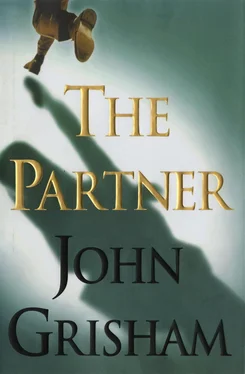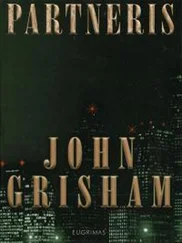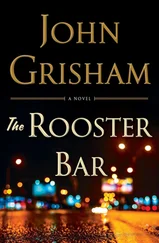“Gee thanks. Look, I can indict you for mutilating the corpse. We’ll call him John Doe.”
“Why not Jane Doe?” Sandy asked.
“Whatever. And we’ll pull the records of every old codger who died in early February of 1992. We’ll go to the families, see if they’ve talked to you. We might even get a court order, dig up a few graves. We’ll take our time. Meanwhile, you’ll get transferred to the Harrison County Jail, where I’m sure Sheriff Sweeney will see the need to give you a few good cellmates. We’ll oppose bail, and no judge will grant it because of your propensity to flee. Months will go by. Summer will come. The jail has no air conditioning. You’ll lose some more weight. We’ll keep digging, and with a little luck we’ll find the empty grave. And in exactly nine months, two hundred and seventy days after the indictment, we’ll go to trial.”
“How are you going to prove I did it? There are no witnesses, nothing but some circumstantial evidence.”
“It’ll be close. But you miss my point. If I drag my feet getting the indictment, I could add two months to your sentence. That’s almost a year you’ll spend in the county jail before trial. That’s a long time for a man with plenty of money.”
“I can handle it,” Patrick said, staring into Parrish’s eyes, hoping he didn’t blink first.
“Maybe, but you can’t run the risk of getting convicted.”
“What’s your bottom line?” Sandy asked.
“You gotta look at the big picture,” Parrish said, spreading his hands wide above his head. “You can’t make fools out of us, Patrick. The feds have hit the back door. The state doesn’t have much left. Give us a notch for our belts, something.”
“I’ll give you a conviction. I’ll walk into a courtroom, face the Judge, listen to your routine, and I’ll plead guilty to the felony charge of mutilating the corpse. But I get no jail time. You can explain to the Judge that the family does not want to prosecute. You can recommend a suspended sentence, probation, fines, restitution, credit for time served. You can talk about the torture and what I’ve been through. You can do all that, Parrish, and you’ll look very good. Bottom line is this: no jail.”
Parrish tapped his fingers and analyzed it. “And you’ll reveal the name of the victim?”
“I will, but only after we have a deal.”
“We have authorization from the family to open the casket,” Sandy said, waving another document briefly before returning it to the file.
“I’m in a hurry, Terry. I have places to go.”
“I need to speak with Trussel. He’ll have to approve this, you know.”
“He will,” Patrick said.
“Do we have a deal?” Sandy asked.
“As far as I’m concerned we do,” Parrish said, then turned off the recorder. He gathered his weapons and stuffed them into his briefcase. Patrick winked at Sandy.
“Oh, by the way,” Parrish said as he stood. “I almost forgot. What can you tell us about Pepper Scarboro?”
“I can give you his new name and Social Security number.”
“So he’s still with us?”
“Yes. You can track him down, but you can’t disturb him. He’s done nothing wrong.”
The D.A. left the room without another word.
Her two o’clock appointment was with a senior vice president of DeutscheBank, London branch. He was a German with perfect English, an impeccably tailored navy double-breasted suit, rigid manners, and a fixed smile. He gazed for one split second at her legs, then got down to business. The wire from his bank, Zurich branch, would be for one hundred and thirteen million dollars, sent immediately to the AmericaBank, Washington branch. She had the account numbers and routing instructions. Tea and biscuits were brought in as he excused himself to have a private chat with Zurich.
“No problem, Ms. Pires,” he said, smiling warmly now as he returned and took a biscuit for himself. She certainly hadn’t expected any problems.
His computer hissed with quiet efficiency, and a printout emerged. He handed it to her. After the wire, the balance in DeutscheBank would be one point nine million dollars and change. She folded it and put it in her purse, a sleek new Chanel.
Another Swiss account had a balance of three million. A Canadian bank on Grand Cayman held six point five million. A money manager in Bermuda was investing over four million for them, and seven point two million was currently parked in Luxembourg, but was about to be moved.
When her business was complete, she left the bank and found her car and driver parked nearby. She would call Sandy, and pass along her next movements.
Benny’s stint as a federal fugitive was brief. His girlfriend spent the night in Frankfurt, then flew to London, landing at Heathrow around noon. Since they knew she was coming, the customs officer double-checked her passport and made her wait. She wore dark sunglasses and her hands shook. It was all captured on video.
At the cab stand, she was unknowingly detained by a policeman who appeared to be in charge of whistling for taxis. He asked her to stand over there, next to those other two ladies, while he worked the traffic. Her driver was a true cabbie, but only seconds earlier had been briefed and given a small radio.
“Athenaeum Hotel on Piccadilly,” she said. He eased away from the terminal in heavy traffic, and nonchalantly gave the destination on the radio.
He took his time. An hour and a half later, he deposited her at the door of the hotel. She waited again at the registration desk. The assistant manager apologized for the delay, but the computer was down.
When word came that the phone in her room was adequately tapped, they gave her a key and a bellman took her away. She tipped him lightly, locked and chained her door, and went straight for the phone.
The first words they heard her say were, “Benny, it’s me. I’m here.”
“Thank God,” said Benny. “Are you okay?”
“I’m fine. Just scared.”
“Did anyone follow you?”
“No. I don’t think so. I was very careful.”
“Great. Look, there’s a little coffee bar on Brick Street near Down, two blocks from your hotel. Meet me there in an hour.”
“Okay. I’m scared, Benny.”
“Everything’s fine, dear. I can’t wait to see you.”
Benny wasn’t at the coffee bar when she arrived. She waited for an hour before panicking and running back to her hotel. He didn’t call, and she didn’t sleep.
The next morning, she gathered up the morning papers in the lobby and read them over coffee in the dining room. Deep in the Daily Mail she finally found a two-paragraph blip about the capture of an American fugitive, one Benjamin Aricia.
She packed her bags and booked a flight to Sweden.
With Judge Karl Huskey whispering into the ear of his colleague Judge Henry Trussel, it was established that the Lanigan matter should take precedence until it was put to rest. Rumors of a deal were floating throughout the legal community in Biloxi, rumors chased and being chased by even more gossip about the poor Bogan firm. In fact, nothing else was being discussed in the courthouse.
Trussel began the day by calling in T.L. Parrish and Sandy McDermott for a quick update, which eventually lasted for hours. Patrick was brought into the discussion on three occasions by use of Dr. Hayani’s cell phone. The two, patient and doctor, were playing chess in the hospital cafeteria.
“I don’t think he’s cut out for jail,” Trussel mumbled after the second call to Patrick. He was visibly and verbally reluctant to let Patrick off the hook with such ease, but a conviction was a longshot. With a docket filled with drug dealers and child molesters, he wasn’t about to waste time with a high-profile corpse mutilator. All the evidence was circumstantial, and given Patrick’s current reputation for meticulous planning, Trussel doubted a conviction.
Читать дальше












